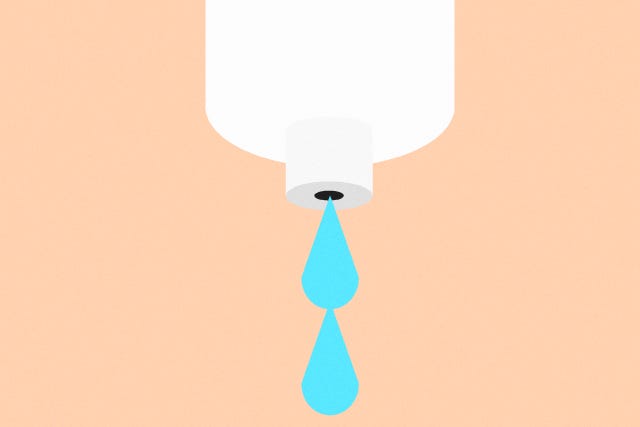 Illustrated by Ly Ngo.
Illustrated by Ly Ngo.Update: This story was originally published on September 19.
By Kendall McKenzie
There are a lot of misconceptions floating around out there about the type of person who’s down with going to butt town. But, the reality is, anal enthusiasts don't fit a certain type. Anuses are home to some pretty sensitive nerve endings that can be quite receptive to stimulation, so it's no wonder anal sex is a regular part of a lot of our sex lives.
On the flip side, plenty of people try it and simply don’t like it. And, then there are those folks who never try it because they’re totally uninterested in it in the first place. Still others enjoy it sparingly or choose to save it for special occasions. Some like giving but not receiving (and vice versa). This is all 100% normal.
AdvertisementADVERTISEMENT
If butt stuff DOES pique your interest, however, here’s what you need to know.
Safety First
Lots of people assume you don’t need protection when going in the back door because pregnancy can’t happen, but anal sex isn’t the most reliable form of birth control. The anus and vaginal opening live in the same neighborhood, and semen can leak out of your B and travel to your V. So, although getting pregnant from anal sex is super unlikely, it's not totally impossible.
Another (really, really) important reason to use protection is to prevent the spread of sexually transmitted infections. Anal sex is riskier than other sex stuff in terms of HIV and other STIs because the tissue back there is so delicate. Penetration can cause irritation and tears — some of which may be invisible — giving STI germs a direct pathway into the body. So, use latex (or latex alternatives, like polyurethane and polyisoprene) condoms to protect yourself. Female condoms can also be used for anal sex if you remove the inner ring first. Extra lubrication makes anal sex safer, too, but, we'll get to that.
 Illustrated by Ly Ngo.
Illustrated by Ly Ngo.Even if your anal adventures don’t always involve a penis (there’s a wide array of butt toys on the market, you know), rules about protection still apply. Use condoms to prevent the spread of STIs if you’re sharing toys. Same goes for switching orifices, since anal germs can make you sick and cause vaginal infections if they get in your mouth or vagina. Always use fresh condoms on toys and penises that have been in a butt before they visit another location, and wash your fingers if they were involved in any foreplay. Rubber or nitrile gloves can also come in handy (get it?). Finally, make sure any toy you put in your butt has a flared base that’ll prevent it from slipping all the way in.
AdvertisementADVERTISEMENT
What about oral-to-anal?
Ah, the salad toss. Like regular ol’ oral sex, analingus (a.k.a. “rimming”) can spread STIs such as herpes , HPV, syphilis, and hepatitis. Additionally, oral/anal sex has its own unique set of health risks, because of potential exposure to butt-specific cooties like E. coli and intestinal parasites. Cleaning your butt with soap and water before analingus helps wash away fecal germs that may be hanging around, but the safest way to practice this activity is to use a barrier between the mouth and anus. Sheer Glyde dams (or dental dams), plastic wrap, or condoms cut up the side and opened flat are all great options. You can even make a dental dam out of a rubber glove by cutting it up the pinkie side and laying it over your partner’s butt. Dabbing a little lube on the genital side of a barrier can make it more pleasurable for the recipient. And, speaking of lube...
 Illustrated by Ly Ngo.
Illustrated by Ly Ngo.Lube
It’s a pretty essential accessory for anal sex. Unlike vaginas and mouths, anuses don’t produce their own lubrication. Adding lubricant makes anal sex way safer, because it reduces friction, which makes anal tearing less likely and helps keep condoms from breaking. Besides all that, anal sex without lube can be pretty uncomfortable.
When choosing a lube, steer clear of anything containing oil (like baby oil, Vaseline, or lotion). Latex — the material most condoms are made out of — and oil are not friends, which means mixing the two is a serious risk for condom breakage. Go for water-based or silicone lubes, which are compatible with condoms and work for both anal and vaginal sex.
AdvertisementADVERTISEMENT
Feelings
Like all kinds of sex, anal should be enjoyable, not uncomfortable or painful. And, it’s worth noting that most porn depicts a highly inaccurate representation of what’s required to actually make anal sex pleasurable.
Going really slow, starting with smaller objects like a finger or toy first, trying to relax, and using lots of lube can all help make things become more pleasant. If you’re with a partner, let them know how you’re feeling throughout the process — especially if you’re in any kind of pain and would rather just stop. Communicating how you’re feeling is important during any kind of sexual activity, and it’s no different when the butt’s involved.
While regular lube is a great idea, creams, gels, and lubes that numb the anus and rectum (usually called something along the lines of “Anal Ease”) are NOT. Pain is your body’s alarm system that tells you if something is wrong, and using numbing products means it’s harder to know if you’re getting hurt.
The bottom line: Anal sex is not something you should endure if you don't like it. If it’s painful, STOP. If it’s uncomfortable, STOP. If you just aren’t into it, STOP. Some people have better experiences after learning how to make anal more enjoyable, while others try every trick in the butt book and still experience discomfort (or just plain don’t care for it). At the end of the day, it’s your butt — and it’s your choice.